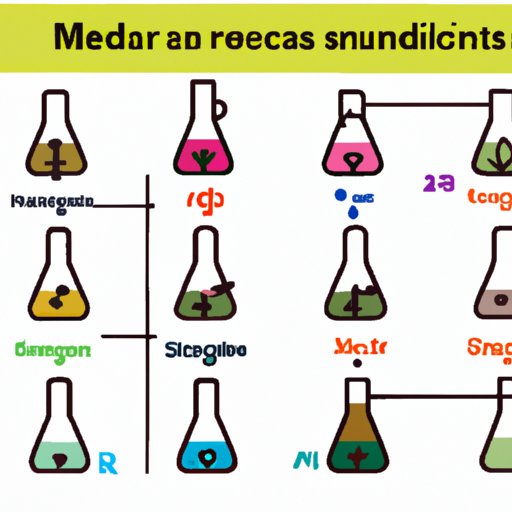Introduction
Medium is an essential part of any scientific experiment. It provides the necessary environment for the experiment to take place, allowing the researcher to observe and measure the results. But what exactly is medium, and what role does it play in scientific research? This article will explore these questions and more, looking at the different types of medium, the impact of medium on scientific experimentation, and the advantages and challenges of using medium in science.
Exploring the Basics of Medium in Science
Medium, or media as it is sometimes called, is a substance used to provide an environment for the growth of microorganisms or to facilitate chemical reactions. It is typically composed of a combination of nutrients, salts, and other compounds that allow the growth of cells and organisms. Mediums can be either organic or inorganic, depending on their composition, and can be either natural or artificial.

Understanding the Role of Medium in Scientific Research
The role of medium in scientific research is to provide the necessary environment for the experiment to take place. Without medium, it would be impossible to conduct experiments with living organisms or to study the effects of certain chemicals and substances on cells and organisms. Medium also plays an important role in controlling the conditions of an experiment, such as temperature, pH, and nutrient availability. By controlling these conditions, researchers are able to better understand the results of their experiments.

A Closer Look at Different Types of Medium and Their Uses in Science
Organic mediums are those composed of natural materials such as plant and animal tissues, proteins, carbohydrates, fats, and minerals. These types of mediums are often used in cell culture and microbiology experiments, as they provide the necessary nutrients for the growth of cells and microorganisms. Inorganic mediums, on the other hand, are composed of synthetic materials such as salts and minerals. These types of mediums are often used in chemical and biochemical experiments, as they provide the necessary environment for conducting these types of experiments. Finally, artificial mediums are composed of laboratory-made substances and are often used in biotechnological and genetic engineering experiments.
Examining the Impact of Medium on Scientific Experimentation
Medium has a significant impact on the success of any scientific experiment. For example, if the wrong type of medium is used, the experiment could fail due to lack of nutrients or the inability of the cells or organisms to grow in the environment provided. Additionally, the use of the wrong type of medium can lead to inaccurate results, as the conditions of the experiment may not be suitable for the type of experiment being conducted. As such, it is important for researchers to carefully select the appropriate type of medium for their experiments.

Analyzing the Advantages and Disadvantages of Medium in Science
Using medium in scientific experiments has both advantages and disadvantages. On the one hand, medium provides the necessary environment for conducting experiments, making it easier for researchers to observe and measure the results of their experiments. Additionally, medium can be used to control the conditions of an experiment, allowing researchers to better understand the results of their experiments. On the other hand, using medium can be time consuming and expensive, as some types of medium may need to be specially prepared or ordered. Additionally, using the wrong type of medium can lead to inaccurate results and even failure of the experiment.
Investigating the Benefits and Challenges of Using Medium in Science
There are a number of benefits to using medium in scientific experiments. According to a study published in Nature, “media enable scientists to manipulate the environment of cells and organisms to investigate the mechanisms underlying their behavior.” By providing the necessary environment for conducting experiments, medium makes it possible for researchers to study the effects of certain chemicals and substances on cells and organisms. Additionally, medium can be used to control the conditions of an experiment, allowing researchers to better understand the results of their experiments.
However, there are also a number of challenges associated with using medium in scientific experiments. For example, some types of medium may need to be specially prepared or ordered, which can be time consuming and expensive. Additionally, using the wrong type of medium can lead to inaccurate results and even failure of the experiment. Furthermore, medium can be difficult to store and transport, making it difficult for researchers to conduct experiments in different locations.
Conclusion
Medium is an essential part of any scientific experiment. It provides the necessary environment for the experiment to take place, allowing the researcher to observe and measure the results. There are a number of different types of medium, including organic, inorganic, and artificial, each of which has its own advantages and disadvantages. Additionally, using medium in scientific experiments can have both benefits and challenges, such as the ability to control the conditions of an experiment and the difficulty of storing and transporting medium. Overall, medium is a vital component of any successful scientific experiment and should be carefully considered when planning and conducting experiments.
Final Thoughts
Medium is an essential part of any scientific experiment and can have a significant impact on the success of the experiment. By understanding the different types of medium and their uses in scientific research, researchers can ensure that they are using the most appropriate type of medium for their experiments. Additionally, by taking into account the advantages and challenges of using medium in scientific experiments, researchers can ensure that they are using medium in the most effective and efficient way possible.
(Note: Is this article not meeting your expectations? Do you have knowledge or insights to share? Unlock new opportunities and expand your reach by joining our authors team. Click Registration to join us and share your expertise with our readers.)
